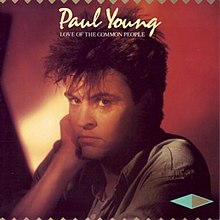Love Of The Common People (song)
| "Love of the Common People" | |||||||||
|---|---|---|---|---|---|---|---|---|---|

Artwork for European releases, including the 1983 UK re-release
|
|||||||||
| Single by Paul Young | |||||||||
| from the album No Parlez | |||||||||
| B-side | "Behind Your Smile" "Wherever I Lay My Hat (That's My Home)" "It's Better to Have (And Don't Need)" |
||||||||
| Released | 1982 7 November 1983 (Re-release) |
||||||||
| Format | 7" vinyl, 12" vinyl | ||||||||
| Genre | Soft rock, Synthpop | ||||||||
| Length | 3:33 (7") 5:50 (12") 4:56 (Original Album) |
||||||||
| Label | CBS | ||||||||
| Writer(s) | John Hurley and Ronnie Wilkins | ||||||||
| Producer(s) | Laurie Latham | ||||||||
| Paul Young singles chronology | |||||||||
|
|||||||||
|
|||||||||
"Love of the Common People" is a folk ballad written by John Hurley and Ronnie Wilkins, eventually released in 1970 on John Hurley's album John Hurley Sings about People, but first sung in January 1967 by The Four Preps. It had been covered by The Everly Brothers, country singers Waylon Jennings and Lynn Anderson, Pennsylvania Sixpence and also Wayne Newton, all in 1967, The Simple Image, Leonard Nimoy, reggae singer Eric Donaldson and the Gosdin Brothers in 1968, Elton John and also soul group The Winstons, both in 1969, John Denver on his 1969 album Rhymes & Reasons, Sandy Posey in 1970, the same year that reggae singer Nicky Thomas had a big hit in Europe with the song, and pedal steel guitarist Sneaky Pete Kleinow in 1979. It was also a hit in Ireland for showband star Joe Dolan. Wanda Jackson covered the song in 1971, as did Stiff Little Fingers and English pop singer Paul Young, both in 1982. In 2007 Bruce Springsteen covered it as part of his Seeger Sessions tour, releasing a live version of it as a bonus track on his Live in Dublin album.
The lyrics tell a bleak story of poverty and unemployment. There is a mention of "free food tickets," a reference to government food stamp and welfare programs, in the very first line, and the lyrics also describe the subject family as having holes in their clothes and their shoes. The last verse, however, is more optimistic, as it essentially advises the subject family to keep their faith strong and to maintain hope for improvement.
...
Wikipedia
